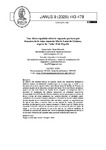Una sátira española sobre la supuesta postura pro francesa de la reina consorte María Luisa de Orleans, esposa de Carlos II de España

Use this link to cite
http://hdl.handle.net/2183/27382
Except where otherwise noted, this item's license is described as Atribución-NoComercial-SinDerivar 4.0 Internacional
Collections
Metadata
Show full item recordTitle
Una sátira española sobre la supuesta postura pro francesa de la reina consorte María Luisa de Orleans, esposa de Carlos II de EspañaAlternative Title(s)
A Spanish Satire on the Supposed Pro-French Stance of Marie Louise D'Orléans, Queen Consort of Charles II of SpainDate
2020-08-26Citation
Terán Elizondo, M.I., Lira Saucedo, S.A. (2020). Una sátira española sobre la supuesta postura pro francesa de la reina consorte María Luisa de Orleans, esposa de Carlos II de España. Janus: estudios sobre el Siglo de Oro, 9, 443-478. https://www.janusdigital.es/articulo.htm?id=138
Abstract
[Resumen] El objetivo del presente artículo es explicar, desde una perspectiva filológica e histórica cultural, el manuscrito titulado Copia de un papel que se halló en un escritorio de la reina, nuestra señora doña María Luisa de Borbón de Francia, en principio hallado en la denuncia y proceso del Santo Oficio de México al mestizo Ignacio de San Juan Salazar de Puebla de los Ángeles. La indagación llevó a encontrar 22 ejemplares del referido manuscrito, en diferentes repositorios documentales entre la Península Ibérica y América, de los que la mayoría carecen de fecha y firma, así como paratextos que pudieran dilucidar al verdadero autor. Además de dar a conocer el papel y destacar su importancia, en este trabajo interesa develar algunas de sus características más relevantes, exponer los argumentos por los que es una sátira, y mostrar cómo, en una especie de "espejo de princesas" invertido, el desconocido autor intenta convencer a María Luisa de Orleans de las supuestas "virtudes" políticas de una reina, pero de una que es leal a su patria de origen y no a la que gobierna, lo que a los ojos de sus súbditos españoles la convertía en una traidora, pasando así, de ser la aparente protagonista del escrito, a la principal víctima de las supuestas maquinaciones políticas descritas en él. [Abstract] The objective of this article is to explain, from a philological and cultural perspective, the manuscript entitled Copia de un papel que se halló en un escritorio de la reina, nuestra señora doña María Luisa de Borbón de Francia, in principle found in the denunciation and process of the Saint Office of Mexico to the mestizo Ignazio de San Juan Salazar from Puebla de los Ángeles. The investigation led to the finding of 22 copies of the aforementioned manuscript, in different documentary repositories between the Iberian Peninsula and America, of which the majority lack date and signature, as well as paratexts that could elucidated the true author. In addition to publicizing the role and highlighting its importance, in this work it is interesting to unveil some of its most relevant characteristics, expose the arguments for which we consider it a satire, and show how, in a kind of inverted "princess mirror", the unknown author tries to convince María Luisa of the supposed political "virtues" of a queen, but of one that is loyal to her homeland and not to bhe one she governs, which in the eyes of her Spanish subjects the she became a traitor, thus going from being the apparent protagonist of the writing, to the main victim of the supposed political machinations described in it.
Keywords
Espejo de príncipes
Rescate filológico
Sátira
Mirror of Princess
Philological rescue
Satire
Rescate filológico
Sátira
Mirror of Princess
Philological rescue
Satire
Editor version
Rights
Atribución-NoComercial-SinDerivar 4.0 Internacional
ISSN
2254-7290






